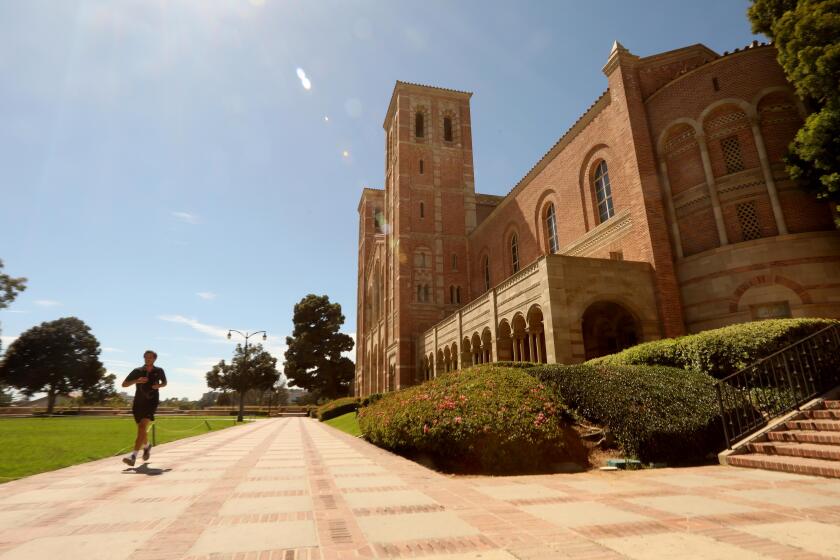COMMENTARY ON MEASURE J : Jail-Tax Backers Should Have Studied Lessons of Measure M : Underlying lack of trust in local government, not Orange Countyâs well-known fiscal conservatism, caused the initiativeâs downfall, UC Irvine pollsters say.
Measure J, the bid to build a new county jail with a half-cent sales tax increase, was roundly defeated Tuesday. Orange County voters turned the measure down by a 3-1 margin. But this solid rejection does not necessarily mean that tax measures to solve the jail crowding problem are condemned to perpetual doom.
It was not the countyâs notorious fiscal conservatism that caused the measureâs downfall. Rather, Measure J failed because of votersâ underlying lack of trust in county government. And on this issue, Measure J can learn some important lessons from another sales tax increase that recently passed on its third try: the Measure M tax for transportation.
Measure J did not suffer from a lack of public interest. The Times Orange County Poll that we conducted for the newspaper in January demonstrated residentsâ high levels of awareness and concern about jail overcrowding. Large majorities of voters opposed the current policies of early release of criminals and cite-and-release of suspects, the methods used to keep the inmate count down. Eight in 10 residents said they considered the jail situation to be a significant local problem. Half said building a new jail should be a high priority for increased public funding.
But right or wrong, voters blame the county leadership for this crisis. In the Times Orange County Poll, just one in six residents gave the Board of Supervisors excellent or good ratings in its handling of jail crowding. And the Sheriffâs Department received positive grades from just one in four.
The Measure J campaign did nothing to improve public confidence.
Instead of working to build consensus, the strategy was to win approval among the small number of voters who would turn out for a special election. Campaign literature explaining the rationale for Measure J reached only a limited audience.
A similar special-election strategy for Measure M in November, 1989, also failed. The transportation sales-tax measure ultimately passed in a high-turnout general election the next year.
Ironically, the crisis of confidence in county government would have been even greater had Measure J succeeded. Just one in six eligible voters cast ballots Tuesday. Had the measure passed, many residents would have felt alienated and left out of the political process. This would have worsened the publicâs distrust of local ballot measures and elected officials.
The events leading up to Tuesdayâs election further eroded voter morale. Initial support for a sales tax increase for a new county jail in Gypsum Canyon, noted in the January poll, was weakened by public controversy.
First, voters watched as their elected leaders feuded. Three supervisors endorsed Measure J; two were vehemently opposed. Some mayors and city council members supported the measure; others actively campaigned against it. Law enforcement agencies supported Measure J, but local lawyers said it was flawed.
This bickering among leaders clearly raised doubts about the measure. Voters need to be assured that their leaders have reached agreement before they will support a local tax increase, as they did with Measure M.
Because the measure was placed on the ballot before the details had been worked out, voters were presented with ballot wording that was vague and incomplete. Measure J did not specify how the tax increase would be spent--notably, if or where a new jail would be built and how much it would cost.
Measure Jâs effects on jail overcrowding, and ultimately improving public safety, also were not addressed. As a result, Measure J was labeled a âblank checkâ by opponents.
By contrast, Measure M voters were provided last fall with a detailed roster of traffic improvement projects that the sales tax increase would fund.
Measure J also suffered from a lack of citizen involvement. When distrust in government is high, as in Orange County today, voters want a bigger role in spending decisions.
Measure J revenues were to go to a newly formed Orange County Regional Justice Facilities Commission. Its appointed members were not widely known to the public.
By contrast, Measure M offered voters a citizensâ oversight committee, whose purpose was to ensure that the money was spent only on traffic projects.
Finally, Measure J had a fatally short campaign. Voters had little opportunity to study the issues, hear the pros and cons and ask their own questions about this critical public policy decision.
The atmosphere of haste that seemed to surround the measure did little to convince people that other, less costly policy options had received adequate consideration. A campaign that lasted just a few months simply did not allow for the kind of in-depth analysis that county voters need to approve a tax measure.
The transportation tax measure, on the other hand, involved years of public hearings and town hall meetings.
The jail crowding problem remains a high public priority. But before Measure J is returned to the ballot, county voters need to know whether there are feasible alternatives to building a new jail. If no alternatives are found to be workable, voters must be told specifically how the tax revenue will be spent.
A measure should be placed on the ballot only after elected leaders have agreed on a detailed plan for solving the problem.
And voters deserve a full chance to participate in the process: being asked for their involvement as a plan is developed, asking questions in the course of a campaign, being given every opportunity to vote in a general election and having an advisory role should the tax measure pass.
All these steps are necessary to build public confidence in the local governmental process.
More to Read
Sign up for Essential California
The most important California stories and recommendations in your inbox every morning.
You may occasionally receive promotional content from the Los Angeles Times.










